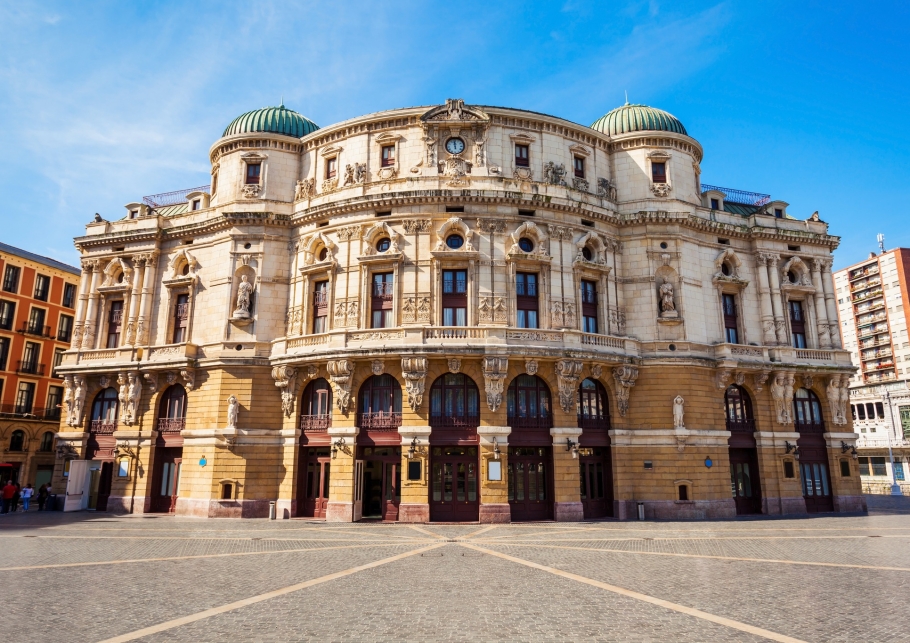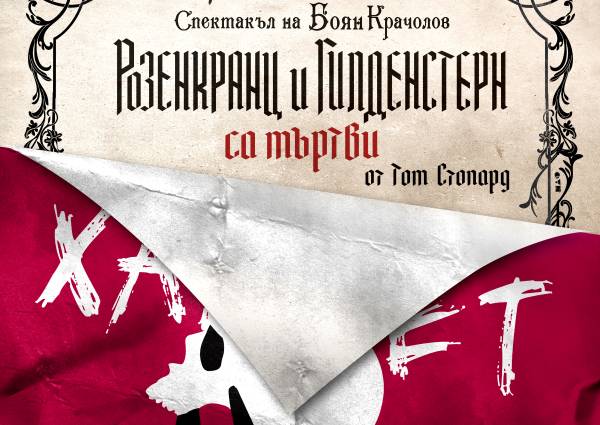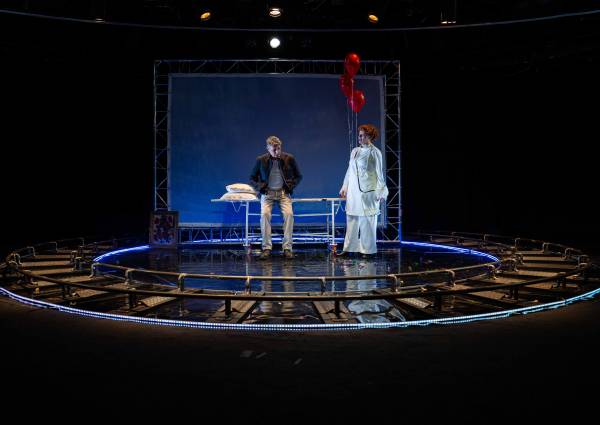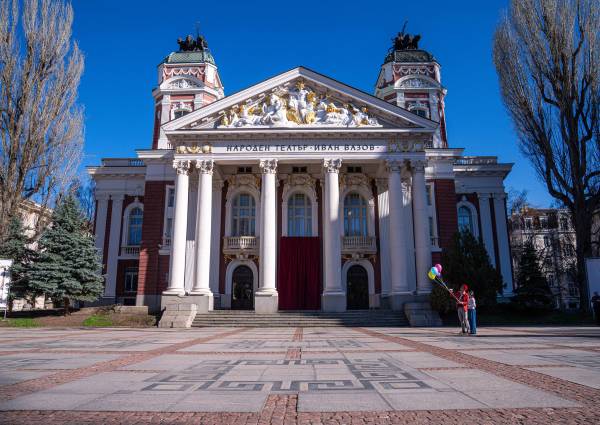The Arriaga Theatre has chosen its own production Moto-Membra Jesu Nostri, the Basque text of which by Eneko Sagardoy is being translated into Albanian; also, Aventurat e familjes Bosh në Unmikistán, by Kosovo playwright Jeton Neziraj, is being translated from Albanian to Basque.
At the workshop, from 26 to 30 April at the Arriaga Theatre in association with Etxepare Euskal Institutua, three translators will be fine-tuning the translations, working closely alongside Sagardoy and Neziraj.
On 29 April, both the playwrights and the translators will be at the round table "Challenges and approaches in the translation of drama", moderated by the director of Etxepare, Irene Larraza, with online links to Kirmen Uribe and playwrights from other European theatres working on the DoSEL project.
***
Bilbao, 14 April 2025.- EU project DoSEL (Drama of Smaller European Languages) is arriving in Bilbao and the Arriaga Theatre is now hard at work with the in situ organisation, from 26 to 30 April, of a workshop to finish the translation of two theatre scripts written in minority languages, each from one language to the other language; and to reflect on the difficulties faced by a play written in a minority language. Specifically, the workshop will involve two European theatres working on the DoSEL project: Teatro Arriaga Antzokia supplies the Basque script of its in-house production Moto-Membra Jesu Nostri, written by actor Eneko Sagardoy, who took the plunge into written drama through a script crammed with beauty and sensitivity, which was highly praised following its premiere in 2022. And Teatri Kombëtar i Kosovës (National Theatre of Kosovo) will also be at the workshop with a play written in Albanian, Aventurat e familjes Bosh në Unmikistán, by Kosovar Jeton Neziraj, a playwright of international renown, held to be one of the best playwrights in the Balkans, with a great number of works warmly received by critics. During the workshop, therefore, the play in Basque will be translated into Albanian and vice-versa, thereby fostering intercultural understanding through theatre, which in fact is one of the ultimate objectives of the DoSEL project.
This workshop is being organised by the Arriaga Theatre in association with Etxepare Euskal Institutua. This Basque institute helped the Arriaga Theatre find the translators who are making it possible to render the play in Basque in Albanian, and vice-versa. Its director Irene Larraza will also be moderating a round table on 29 April, as an activity in conjunction with the workshop.
Linguistic challenges
One major difficulty faced by any play script written in a minority language is the impossibility of translating it directly into another minority language. Therefore, whereas any play in English, Spanish, French or German (by way of a few examples) can be translated directly into any language, and any language can be translated into those global languages, it is highly unlikely that one minority language can be translated directly into another minority language. Applying this to the real-life examples to be examined during the workshop: if it is difficult enough to find someone who speaks Basque and Albanian, finding a qualified translator able to translate between both languages is next to impossible. This calls for translation into a global language as a kind of bridge, which generally requires two translators to be engaged, thereby increasing the cost and therefore making it more difficult for a play written in a minority language to move beyond its original country or region, with all this entails in terms of cultural homogenisation and impediments in relation to diversity. The DoSEL project, in fact, sets out to home in on this kind of reality.
Three translators with extensive experience in the translation of literary and theatre texts are involved in this process, which will culminate with the Arriaga workshop from 26 to 30 April. The translation of Moto-Membra Jesu Nostri from Euskera to Albanian was smoother, because Eneko Sagardoy took it upon himself to translate it from Basque into Spanish, and so only one translator was required. The translation from Spanish to Albanian is by writer and translator Bashkim Shehu, and he will be working alongside Sagardoy during the workshop to fine-tune the translation, discuss it, assist with the final changes etc. The process to translate Aventurat e familjes Bosh në Unmikistán from Albanian to Basque, however, is being carried out by two female translators who will be working with Jeton Neziraj during the workshop: María Roces González is translating the text into Spanish, and Izaskun Gracia Quintana from Spanish to Basque.
During the workshop, Eneko Sagardoy and Jeton Neziraj and the three translators will reflect on the difficulties they encountered during the process and the challenges to be resolved during the workshop, some of which can also be anticipated, such as, for example, ways to render sentences, sayings or expressions with specific connotations in a language when you have to translate them into another, or into several languages because a bridge language is being used. It will also be interesting to observe their approach to the tone of the texts in each language, bearing in mind that these are scripts for plays to be acted out on a stage. In this regard, it will certainly be an extremely enriching and interesting experience for the translators to contrast any queries or decisions with the playwrights directly, and even discuss a number of possible alternatives with them.
Round table on Tuesday 29
These are exactly the issues which, more specifically and open to other opinions, will be discussed by the members of the round table organised for 29 April, "Challenges and approaches in the translation of drama". This activity in conjunction with the workshop will be moderated by Irene Larraza, director of Etxepare Euskal Institutua, and will feature the two authors, Sagardoy and Neziraj, and the three translators. Moreover, to bolster the event with interesting contributions, it will also feature Kirmen Uribe, one of the Basque writers whose works - literary, in his case - have been translated into the most languages, and who will be linked in via Zoom. The event will also be attended by Jure Novak, a renowned Slovenian playwright and director, fully committed to the reality of minority languages in Europe. In fact, he is one of the promoters of the DoSEL project. Finally, a number of playwrights from other European theatres working on the DoSEL project are expected to join the event online.
It should be borne in mind that, in addition to the Arriaga Theatre and the National Theatre of Kosovo, the following cultural spaces are also involved in the project: Presernovo gledalisce Kranj (Slovenia), National Agency for the Performing Arts (Malta), Croatian National Theatre in Zagreb (Croatia), Foundation Estonian Theatre Agency (Estonia), "Ivan Vazov" National Theatre (Bulgaria) and Sala Beckett (Catalonia).
The Arriaga Theatre has thrown itself eagerly into this project, which seeks to boost cultural diversity in Europe by exchanging experiences and collaborating with other theatres on the old continent which also work in languages with a smaller territorial reach.
Finale "gift"
By way of a finale, on 30 April all those taking part in the workshop will attend the premiere of Mari-Eli, the Arriaga Theatre's new in-house production of an unknown "zarzuela" or musical theatre by Jesús Guridi which, following a critical revision of the score, will be performed with Calixto Bieito as stage director and Jon Malaxetxebarria as music director.
For further information:
Communication - ARRIAGA THEATRE
Jon Rozadilla Urrutia – 652 738 307
comunicacion@teatroarriaga.eus
www.teatroarriaga.eus






